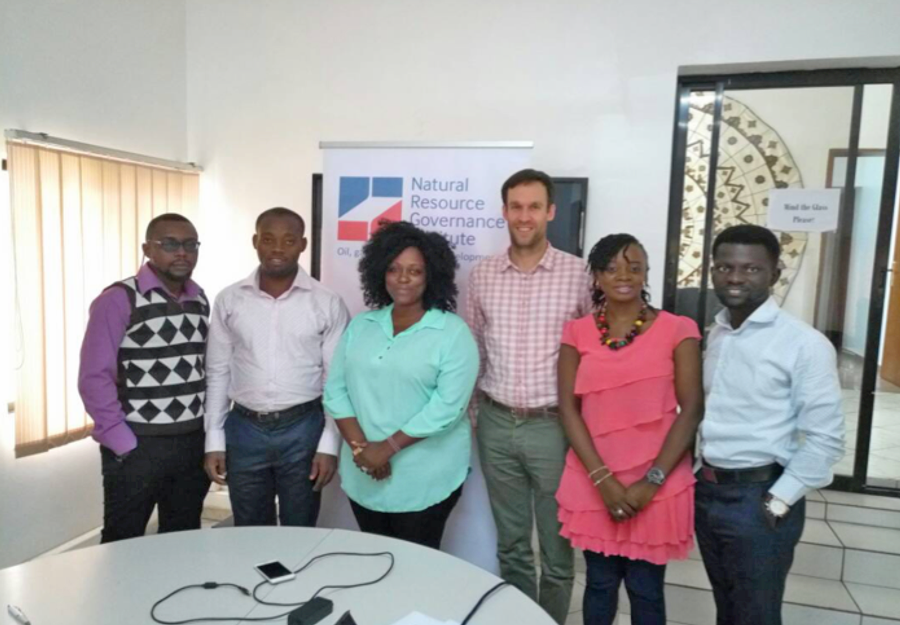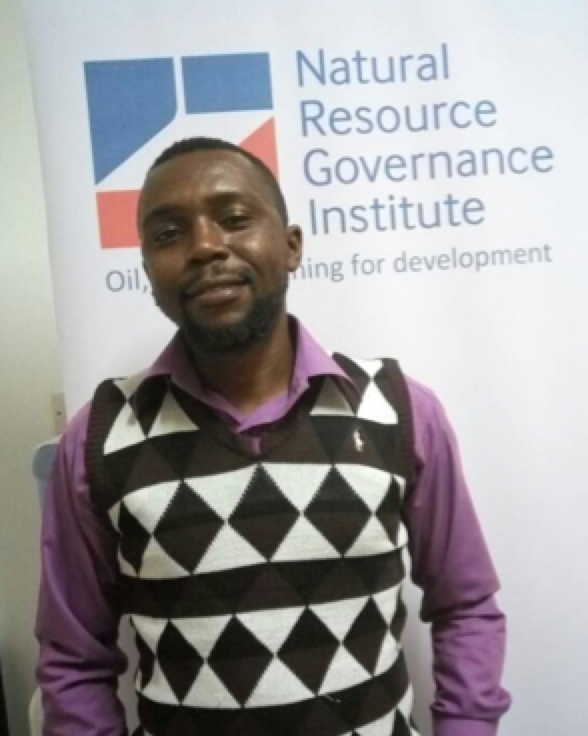
Nigeria Media Fellowship Aims to Sharpen Oil, Gas Coverage
In late June, NRGI Nigeria manager Sarah Muyonga shared the results of the Resource Governance Index with a select group of journalists, homing in on Nigeria-specific findings. It was part of an orientation for Punch Newspaper’s Femi Asu, Daily Trust's Daniel Adugbo and Premium Times’ Benjamin Ezeamalu.
 From left, Ben Ezeamalu; Daniel Adugbo (both MFOR fellows); Sarah Muyonga, NRGI Nigeria manager; Will Fitzgibbon, journalist at ICIJ; Toyin Akinniyi, NRGI media capacity development associate, and Femi Asu, MFOR fellow
From left, Ben Ezeamalu; Daniel Adugbo (both MFOR fellows); Sarah Muyonga, NRGI Nigeria manager; Will Fitzgibbon, journalist at ICIJ; Toyin Akinniyi, NRGI media capacity development associate, and Femi Asu, MFOR fellow
“The opacity of activities in the sector, the cabal-like attitudes of the players, and the apparent pervasive corruption have served to fuel my interest in Nigeria's oil and gas sector,” Ezeamalu said.
NRGI is supporting Benjamin and his colleagues through the Media for Oil Reform Fellowship, a development program designed to promote reporting that deepens knowledge of the Nigeria oil sector and that drives positive change. Through the fellowship, the journalists will focus on transparency and accountability in the governance of the oil and gas sector in Nigeria; the governance of the powerful Nigerian National Petroleum Corporation; and the governance of Nigeria’s oil and gas licensing processes.
A unique feature of the fellowship is that it is non-residential: fellows experience minimum disruption to their work schedules while taking advantage of a guided professional learning experience.
In-depth investigative reporting of Nigeria’s oil sector is a clear need. The NRGI-MFOR fellows will seek to bridge this gap from July 2017 to June 2018.

Ben Ezeamalu
Premium Times
Ben Ezeamalu
Premium Times
Ezeamalu is assistant managing editor, metro editor, and head of Lagos operations at Premium Times, where he has covered the oil and gas sector for years. Ben also freelances for The New York Times and al-Jazeera.
He began his journalism career at NEXT (234next.com), first as a reporter on the metro desk before rising to become a features writer, assistant metro editor and then metro editor. He joined Premium Times as a senior reporter in 2012.
Ezeamalu won the 2015 Africa Fact-Check Award, was nominee for the CNN/African Journalist of the Year in 2014 and Journalist of the Year at the Future Awards in 2013.
He is a graduate of microbiology from the University of Jos, Nigeria.

Femi Asu
The Punch
Femi Asu
The Punch
Femi Asu currently covers the oil and gas and power industries at PUNCH Newspapers. Femi started covering the energy sector in 2012 while at BusinessDay.
Asu won the CNN MultiChoice African Journalist of the Year Award (economics and business) in 2015 and was named Business Reporter of the Year at the 2017 Nigerian Writers Awards.
Asu is trained as an accountant. He has continued to hone his journalism skills by attending such courses as the Advanced Financial Journalism Course at Press Association, London, and the Advanced Writing and Reporting Skills Course at the School of Media and Communication, Pan-Atlantic University, Lagos.

Daniel Adugbo
Daily Trust
Daniel Adugbo
Daily Trust
Daniel Adugbo is a seasoned journalist with more than five years’ experience with Daily Trust newspaper, where he reports on oil, gas and mining activities in Nigeria and around the world.
Adugbo’s news judgment is driven by the belief that the extractive sector of a country has the potential to radically transform its citizen, but the sector also needs sustainable reforms, regulatory framework, practical revenue sharing and community engagement.
Adugbo continues to hone his skills through participation in national and international oil and gas training and related events.
Toyin Akinniyi is media capacity development associate at NRGI.